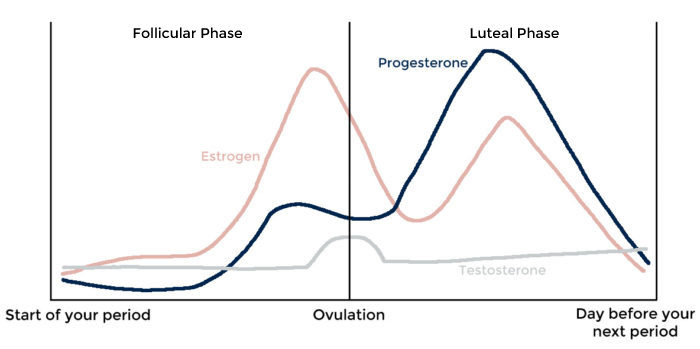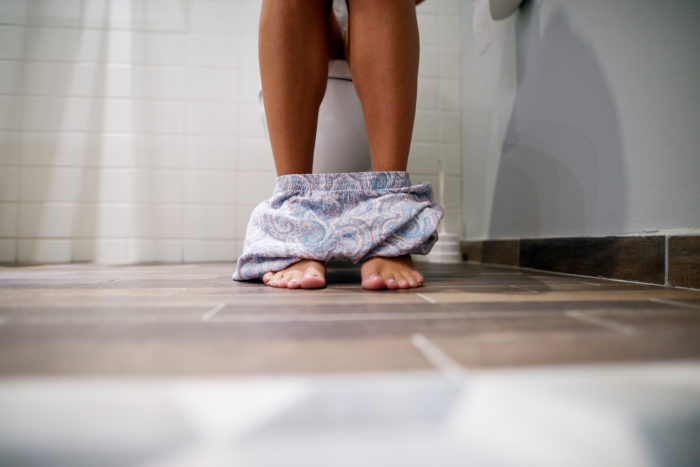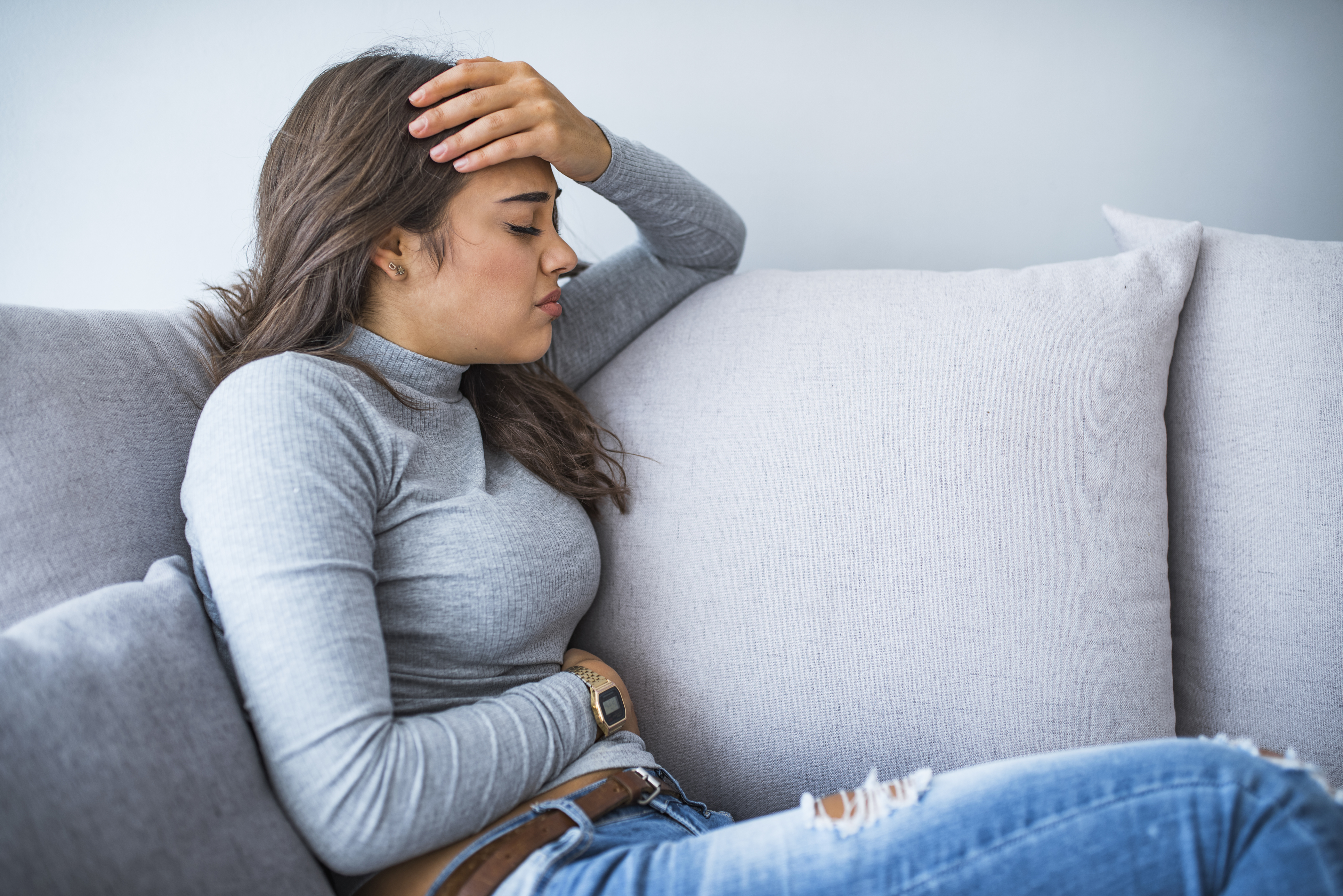Did you know that hormonal changes during your menstrual cycle can cause digestive issues, especially around your period or even when you ovulate?
Before menopause, women’s hormones are in a constant state of fluctuation. This is a very necessary process in order to prepare our bodies to potentially carry a child every month.
But these hormonal fluctuations can also bring about a variety of unpleasant side effects.
I’m sure you’re familiar with the emotional and mental side effects of your impending period. Things like mood swings, cravings, fatigue, and insomnia are all common occurrences around that time of the month.
As if these symptoms weren’t difficult enough to deal with, our changing hormones throughout our cycle can also cause an increase in digestive symptoms.
If you’ve ever experienced diarrhea, constipation, abdominal pain, gas, or bloating at seemingly random intervals during the month, your hormones could be to blame.
The hormonal fluctuations that occur around ovulation and the start of your period are responsible for these IBS-like digestive symptoms.
In this post, I’ll share why these odd digestive troubles occur and how you can find relief through some targeted diet and lifestyle changes.
If you’re ready to learn more about these once seemingly unexplainable digestive woes, keep reading!

Your Hormones During Your Menstrual Cycle
Before we dive into how your hormones can affect your digestion, it’s important to have a good understanding of how our hormones change throughout our cycle.
Our menstrual cycle consists of two distinct phases with different hormones dominating each one.
The first phase, the follicular phase, lasts from the day you start your period until the day you ovulate. This phase, which varies widely in length from woman to woman, is dominated by the sex hormone estrogen.
Then the luteal phase occurs from the day you ovulate until the day before your next period. This phase is typically the same length, give or take a day or two, for each woman, and is dominated by the sex hormone progesterone.
Charts like the one below are useful for helping to visualize the hormonal changes during each phase of our cycle.

As you can see from the chart above, estrogen is at its peak right before we ovulate. And both estrogen and progesterone are elevated until a few days before your period.
This is important to keep in mind as we dive into how these hormonal changes affect our digestion.

How Your Hormones Impact Your Digestion
We know that the food we eat and our stress levels can impact our digestion.
Our hormones and how they change over the course of a month can also play a role in our digestive function.
It’s likely that if you experience hormone-related digestive troubles, it’ll either show up around ovulation or the start of your period. (Or both!)
This is because it’s during these two times of the month when our sex hormones are most in flux.
The relationship between our hormones and our digestion exists because there are receptor cells for estrogen and progesterone in our digestive tract.
These receptor cells are responsible for the IBS-like symptoms that often accompany the changes in your hormones during your menstrual cycle.
Now let’s take a look at how the hormonal changes around both ovulation and your period can affect your digestion!

Digestive ISsues Around Ovulation
Around ovulation, women are more likely to experience digestive complaints of bloating and constipation.
These can be normal symptoms of eating food that didn’t agree with you or not consuming enough fiber (or maybe even too much fiber). But, if you’re consistently bloated and constipated around ovulation each month, your hormones are likely to blame.
Estrogen is the hormone primarily responsible for your extra bloat and backed up feeling during the few days surrounding ovulation.
If you remember, estrogen levels peak right before you ovulate.
These higher estrogen levels can result in a slower large intestine transit time and can make your body hold on to excess water. Both of which are key players in bloating and constipation.
When your intestinal transit time is slowed, it takes the contents of your digestive tract longer to complete the journey out of your body.
Couple that with estrogen’s affinity to keep our body holding onto water instead of releasing it into your gut, and you have a perfect storm for constipation.
But don’t worry, you’re not destined for constipation in the middle of your cycle forever! There are some simple dietary and lifestyle adjustments you can make to keep your gut moving during this time of the month.

Digestive Issues Around Your Period
Around the start of their period, women are more likely to experience diarrhea and symptoms like abdominal pain and nausea.
To trigger the start of your period, both your estrogen and progesterone levels plummet.
The sharp decline in these hormones is critical to initiate the shedding of your uterine lining. But it can also have some unwanted side effects on your digestion.
When estrogen and progesterone start their sharp decline, other compounds called prostaglandins are released.
Prostaglandins are produced by endometrial cells that make up the lining of your uterus. When these cells break down with the decline in your sex hormones, your body is flooded with prostaglandins.
Would you like to save this post?
Your email address is 100% safe and will never be sent spam.
These compounds work to relax smooth muscle and create inflammation, causing the uterus to contract during your period. Essentially, prostaglandins are behind the uncomfortable cramps and headaches you may experience as PMS symptoms.
Along with relaxing your uterus, this increase in prostaglandins is also responsible for the relaxation of your digestive tract muscles. When your digestive tract is more relaxed, you’re more likely to experience diarrhea.
Women who experience diarrhea around the start of their period have higher levels of prostaglandins in their system than women who typically don’t have diarrhea.
And if diarrhea is an issue around the start of your period, you’re also more likely to have heavier, more painful periods than women whose bowel habits aren’t affected.
While this may seem completely unfair, you’re not stuck with painful periods and digestive upset forever. There are some simple dietary and lifestyle adjustments you can make that can help improve your quality of life around this time of the month.

Ways to Find Digestive Relief
Experiencing cramps, mood swings, and other downright annoying hormonal symptoms is more than enough to deal with as a natural part of being female.
When you throw digestive symptoms in the mix, I wouldn’t blame you if you’d rather your menstrual cycle just disappear for good. (PS – that’s not a good thing if it happens.)
Thankfully, we’re not doomed to experience digestive distress around ovulation or when we get our periods. And we don’t even need to rely on hormonal contraceptives or tons of expensive supplements to help regulate our digestion.
There are some simple dietary and lifestyle changes that we can make to offer targeted support to our hormonal and digestive systems during these times of the month.

Digestive Relief Around Ovulation
Here are some tips to help keep your gut moving during the middle of your cycle.
Your digestive system is in a stagnant state when you’re constipated.
During this time you’ll want to focus on activities and consuming foods that can help get your gut (and your body as a whole) moving again.
Light exercise like walking or slow jogging increases fluid flow throughout your body. This, in turn, can help improve the function of your digestive tract, helping to relieve constipation.
Be aware: exercising too intensely can do more harm than good when it comes to your digestion. So be careful not to overdo it when your goal is simply to help relieve your ovulation associated constipation.
Consuming bitter foods can help increase the production of stomach acid and bile in your gut. Getting more of these digestive juices flowing can help improve your intestinal transit time and provide constipation relief.
Some great bitter foods to include, especially right before or with your meals, are:
- Apple cider vinegar
- Leafy greens (especially dandelion greens)
- Beets
- Grapefruit
- Cranberries
- Brussels sprouts
- Ginger
- Mint
Upping your intake of dietary fat, fiber, and water can also help lessen your bloating and constipation.

Digestive Relief For Around Your Period
If you’re experiencing diarrhea and cramping around your period, focusing on reducing inflammation and supporting your digestion will be a big help.
Try increasing your consumption of anti-inflammatory foods in the week leading up to your period.
This can help reduce your overall inflammation and make your periods less painful.
Foods that have strong anti-inflammatory properties are things like:
- Fatty fish
- Leafy greens
- Berries
- Green tea
- Bone broth
- Turmeric
- Garlic
- Ginger
Along with increasing your intake of anti-inflammatory foods, avoiding foods that are common causes of inflammation can also help your symptoms.
Common inflammatory foods for some people include dairy, sugar, and grains. And most people will experience increased inflammation from highly processed foods, alcohol, and sugary beverages.
Upping your intake of dietary fiber can also be really helpful in reducing your digestive symptoms around your period.
Some high fiber foods that you can include in your diet during this time of the month are:
- Lentils (soaking them before cooking makes them easier to digest!)
- Chia seeds
- Broccoli
- Avocados
- Artichokes
- Almonds
- Apples
- Berries
- Whole grains
Another way to get more fiber in is by consuming prebiotic foods or supplements. Many of those high fiber foods listed also contain prebiotics, and my favorite way to get supplemental prebiotics is through my friend Kelsey’s beverage products, Gut Power Drinks.
Reducing Prostaglandins
Prostaglandins are the culprits behind your diarrhea and cramping during the start of your period. Thankfully, there are some dietary changes we can make to help reduce prostaglandin levels, and hopefully reduce those pesky period symptoms.
The consumption of green tea (Here’s one favorite brand and here’s the other favorite!), magnesium-rich foods, and licorice have all been shown to reduce prostaglandin levels.
Making an effort to include more of these foods in your diet is a great way to naturally reduce your digestive symptoms that pop up around the start of your period!

Balance Your Hormones, Balance Your Digestion
We can’t discount the role our hormones play in digestive symptoms around ovulation and menstruation.
Our gut is so intimately connected to other body systems, like our skin and our brain, that it’s not too difficult to believe that there is a connection with our hormones as well.
These digestive symptoms can occur during our cycle even if you do have a normal hormonal balance. But if your hormones are imbalanced, it can create even more digestive havoc.
If you’ve tried adjusting your diet and lifestyle without seeing any improvement in your symptoms, you might need to dig a little deeper.
Working with a trained practitioner (like me!) to figure out what’s at the root of your digestive issues during certain times of the month is the best way to finally find relief.
If this sounds like something you could benefit from, I’d love to be there to help you! You can sign up for my new client waitlist if you’d like to become a client of mine. I email this list regularly when new spots are available to work with me!
Do you notice digestive symptoms during certain times of the month? Do they line up with what the research says, or do you have different digestive complaints? Share your experiences in the comments!
This post may contain affiliate links. If you click on a link and make a purchase, I may receive a small commission.

+ show Comments
- Hide Comments
add a comment